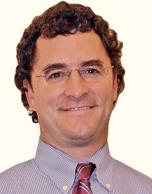 Bryan Huber, MD, is the head of orthopedic surgery and medical director of rehabilitation services at Copley Hospital in Morrisville, Vt. Dr. Huber practices with Mansfield Orthopaedics at Copley Hospital. He focuses on total joint replacement, sports medicine and hip and knee injuries. Dr. Huber serves as a team physician for the United States Ski and Snowboard Association and medical advisor for the Stowe Mountain Ski Patrol and Topnotch Resort. He also serves as a team physician for Johnson (Vt.) State College.
Bryan Huber, MD, is the head of orthopedic surgery and medical director of rehabilitation services at Copley Hospital in Morrisville, Vt. Dr. Huber practices with Mansfield Orthopaedics at Copley Hospital. He focuses on total joint replacement, sports medicine and hip and knee injuries. Dr. Huber serves as a team physician for the United States Ski and Snowboard Association and medical advisor for the Stowe Mountain Ski Patrol and Topnotch Resort. He also serves as a team physician for Johnson (Vt.) State College.
Here Dr. Huber shares his thoughts on customized implants, the role of rehabilitation in orthopedics and advice for orthopedic surgeons just beginning to practice.
Q: What attracted you to the field of orthopedics?
Dr. Bryan Huber: My interest in orthopedics began after I sustained several minor orthopedic injuries as a young athlete. I had a chance to observe first hand the role of the orthopedic surgeon and his interaction with patients and other athletes. The movement and mechanical aspects of the body and the restoration of those functions post-injury are what attracted me to orthopedics. I enjoy seeing patients of all ages and the gratification of returning someone to daily and/or sports activities.
Q: Do you think that customized implants will become a standard of care in orthopedics?
BH: I believe that customized implants will become standard care in orthopedics. As computer technology advances and the economies of the scale are achieved, customized implants will be the standard of care. The ability to restore someone's knee to the original anatomic state with maximal bone preservation is especially important as a younger group of patients enters the realm of joint replacement.
Q: Has your position as medical director of rehabilitation services offered you a different perspective on the field of orthopedic surgery?
BH: Being the medical director of orthopedic and rehabilitation services has offered me a slightly different perspective on orthopedic surgery. I believe rehab is a vital part of successful surgery. I feel strongly about developing a close integrated orthopedic rehab program to optimize patient's care. Working closely with physical therapy allows constant feedback during the course of a patient's recovery.
Q: How has working with athletes shaped the way you view patient care?
BH: Athletes push orthopedic surgeons to explore less invasive novel procedures and treatments that potentially allow a quicker, more reliable return to sports.
Q: What advice do you have to offer to orthopedic surgeons just beginning to practice?
BH: When beginning the search for an orthopedic practice, there are several variables that come into play including location, financial reimbursement, practice style and partners. Obtaining all four of these variables is unlikely, but each surgeon must prioritize and not agonize. When starting to practice it is better to have a broad base of interest and as your practice matures you will be able to develop a niche area. In addition, it is important to spend plenty of time with your patients both pre- and postoperatively, have an empathic ear and treat them as one of your family. When counseling patients on surgical options, it is important to develop a true shared decision-making process in which patients are educated on the risks and benefits and the pros and cons of each option, so they can make the best educated decision for themselves.
More Articles on Sports Medicine:
Exciting Developments in Sports Medicine: Q&A With Dr. Bradley Butkovich of Atlantic Orthopaedic Specialists
What Are the Biggest Opportunities for Orthopedics in ASCs? 3 Orthopedic Surgeons Weigh In
7 Statistics on Orthopedic Surgeon Time Spent in the Hospital


